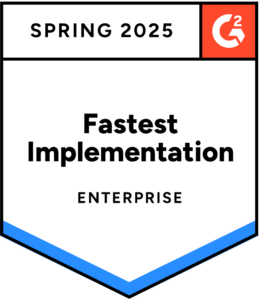Mitigate Risk by Automating Your Accounts Payable and Month-End Close Processes
Blog post
Share
Adra® by Trintech hosted a joint webinar with Glantus, a global provider of accounts payable automation and analytics solutions. Andrew Frazer, Executive Vice President of Glantus, discussed the importance of intelligent automation across accounts payable (AP) processes to mitigate risk, and how capturing data analytics is critical to evaluating organizational performance.
Consequences of Manual Processes on Organizations
It’s becoming more and more apparent that manual processes lead to many short- and long-term consequences for organizations. In fact, our webinar poll revealed that 73% of respondents said manual tasks and processes are the biggest challenges their organization is facing today.
Legacy tools and manual methods can lead to lack of visibility, increased errors, reduced work-life balance, and ineffective controls for AP and financial close processes.
Lack of Visibility Across Financial Processes
Tracking current progress into financial close and accounts payable processes is essential for every organization. Without real-time updates, finance and accounting leaders may find it difficult to navigate the status of essential close tasks and AP transactions.
In addition, both processes require many different levels of communication and collaboration between departments and leaders. As the demands of the finance function change, organizations must leverage automation software to increase their visibility into core finance processes and further support high-level business strategies.
Increased Errors
The more manual your tasks are, the more susceptible those tasks are to errors. Relying on human intervention for tasks that can be easily automated not only burdens accountants to repetitively track transactions and reconcile them, but it also increases the potential for violating compliance regulations.
Reduced Work-Life Balance
The accounting profession is known for a significantly uneven work-life balance; many accountants often sacrifice their holidays, evenings, and weekends to meet the deadlines of each financial close period. Organizations that continue utilizing manual processes and legacy tools further increase the hours needed per full-time employee to close the books.
Ineffective Controls
Financial data affects the entire organization. Accounts payable teams must manually upload invoices and transactional updates into ERP systems, while accounting teams are dependent on the general ledger information when performing reconciliations to ensure their internal controls are being met. Without a standardized and automated process in place, F&A teams may find difficulty in achieving comprehensive compliance.
Benefits of Intelligent Automation in Your AP Process
Intelligent automation is the enablement of data-driven business process automation.
The role of intelligent automation from an AP perspective is the potential to provide reporting and insights for the company. By harnessing the powers of automation, AP professionals can do more than document transactions — they can further address gaps in internal processes, identify any anomalies, and accurately measure performance with analytics.
“We can use sophisticated and impactful technologies, such as artificial intelligence and machine learning. Businesses can address these issues much more efficiently and effectively, as well as remove unnecessary risks and costs.” – Andrew Frazer, Executive Vice President, Glantus
Benefit 1: Optimize Invoice Transaction
Tracking and documenting organizational transactions is a daily task for AP teams. Intelligent automation not only automates those repetitive tasks but also consolidates and standardizes individual processes to boost processing efficiencies by up to 80%.
By automating manual-heavy tasks and streamlining the invoice management process, AP teams can achieve better spend control, shorter invoice processing cycles, and shorter month-end cycles ahead of the reconciliation process. Automation technology captures the invoice format and merges the data with the existing supplier information, further reducing fraud and reporting risk.
Optimizing the invoice transaction process sets up AP teams for success before advancing to the statement reconciliation process.
Benefit 2: Enhance Statement Reconciliation
It’s crucial that companies enhance and automate their statement reconciliation process rather than relying on manual methodologies. In fact, our poll survey indicated that only 5% of respondents have a fully automated AP function in place, meaning the remaining 95% have manual or partially automated processes implemented.
By leveraging intelligent automation technology, organizations can automatically capture the invoice and statement data and document and match it against ledger information. Automating these tasks also removes the reliance on human intervention and ensures all financial data is compliant.
Benefit 3: Capture AP Performance Analytics
Entire organizations are becoming more reliant on accurate, up-to-date, and accessible information. Capturing data analytics from the AP function is instrumental in properly assessing your existing AP processes and evaluating how they can be continuously improved upon.
Harnessing the power of data analytics does more than just present information — it empowers organizations to truly break down business processes to identify the issue at hand and promptly correct the bottleneck or problem before it compounds into far-reaching consequences.
The Business Impact of Intelligent Automation
Accelerating the accounts payable process enables teams to perform other month-end close activities, further improving accuracy and efficiency throughout the entire finance function.
Organizations that implement automation realize more than the short-term benefits – they also achieve a significant return on investment (ROI) in time savings. For example, organizations that leverage automation can see a 50% reduction in time spent on the financial close. Those who automate the AP function also see a positive return on investment by removing 90% of manual processing throughout the entire accounts payable process.
Automation within the finance function is here to stay. By implementing intelligence across your accounts payable and financial close processes, organizations can say goodbye to repetitive and tedious manual work and embrace the future that automation can bring to their organization.






